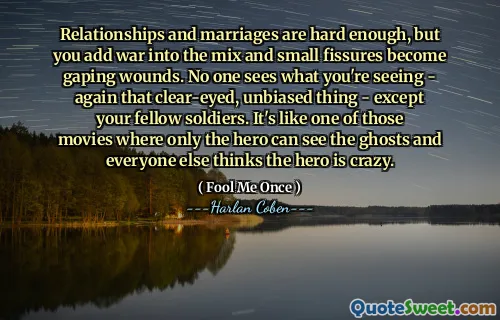
Relationships and marriages are hard enough, but you add war into the mix and small fissures become gaping wounds. No one sees what you're seeing - again that clear-eyed, unbiased thing - except your fellow soldiers. It's like one of those movies where only the hero can see the ghosts and everyone else thinks the hero is crazy.
This quote from Harlan Coben's Fool Me Once poignantly captures the profound strain that war imposes on intimate relationships. It elucidates how combat is not merely a backdrop to life's typical challenges, but rather an intensifier of emotional vulnerabilities already present in human connections like marriages and relationships. The imagery of "small fissures become gaping wounds" beautifully illustrates how minor problems can escalate into profound fractures under the weight of external trauma. It's a metaphor that resonates deeply, as it speaks to the way war can fundamentally alter one's perception and emotional landscape.
The quote also touches on the isolation experienced by those who face war firsthand. The idea that "no one sees what you're seeing... except your fellow soldiers" highlights a crucial and often overlooked aspect of veterans' experiences: a unique form of camaraderie born out of shared trauma. This connection is intensely exclusive; the 'clear-eyed, unbiased' perspective on the horrors witnessed and endured is something only others who lived it can truly comprehend. This sense of isolation from civilians underscores why many veterans struggle to communicate their experiences, sometimes feeling as misunderstood as a movie hero who alone perceives ghosts.
Furthermore, the metaphor of the hero seeing ghosts while everyone else thinks they're crazy underscores the emotional and psychological alienation faced by those affected by war. It suggests a profound internal battle, where external norms and expectations clash with the harsh realities faced by soldiers. This dissonance can lead to feelings of invisibility and disbelief from the outside world, compounding the emotional wounds.
In a broader context, this quote invites readers to consider the complexities behind the external appearances of those touched by war. It urges empathy for the invisible battles and the unseen fractures within relationships affected by such traumatic experiences. Recognizing these hidden struggles is essential for fostering support structures and understanding between soldiers, their loved ones, and society at large.
Ultimately, this passage reminds us that war imprints deeply on personal lives, transforming the ordinary fabric of relationships into something fragile and vulnerable. It calls attention to the silent suffering endured behind closed doors, encouraging a cautious and compassionate approach when engaging with those who carry these scars.







